It isn’t too clear what people were expecting when Noah Hawley, creator of the FX series Legion and Fargo, decided to direct his first feature film, though Lucy in the Sky, starring Natalie Portman, is definitely in the vein of both those popular shows.
Portman plays Lucy Cola, an astronaut who returns from her space-walk to her loving husband (Dan Stevens) only to feel somewhat disappointed with her old life back on earth. She throws herself into training for NASA’s next space mission and ends up having an affair with fellow astronaut Mark Goodwin, played by Jon Hamm. On top of that, Lucy has some fierce competition in Zazie Beetz’ younger astronaut Erin, who might threaten her chances to return to space.
Oddly, the movie has not been received well by critics and did not do particularly well in its first weekend in theaters – they’re probably related. There may just be some misunderstanding about what Lucy in the Skywas meant to be from the initial trailer. That trailer makes Lucy look like some kind of outer space sci-fi but the space factor is just a way into Lucy’s mind and what happens to her. In some ways, this is more of a true-crime story based on a real life woman (Lisa Nowak) and what she went through after returning from space.
The Beat had a chance to sit down with Hawley in New York for the extended interview below, where we talked briefly about Legion coming to an end after three seasons.
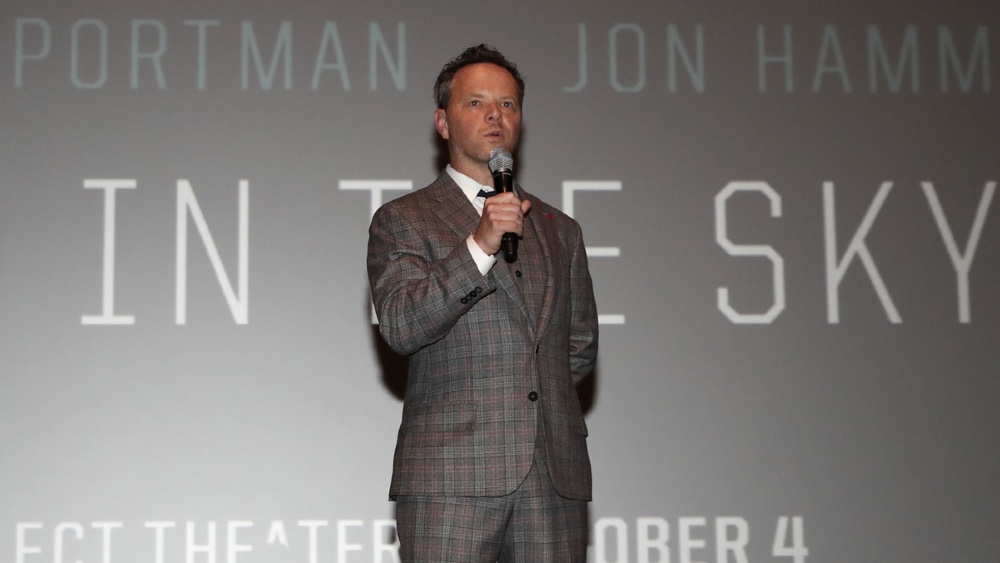
THE BEAT: I saw the movie after it played Toronto and didn’t read much beforehand, so I didn’t know much about what to except other than what I saw in the trailer. What was the transition in your mind to take a break from TV to direct this movie, since making movies takes far more time.?
Noah Hawley: Well, you know, I’ve had the luxury to be able to think about a story and figure out what the best medium is for it — to date it was TV or a novel. But I had written screenplays before. I guess I thought if I’m going to make something for the big screen, it has to be something that you should experience on the big screen. Does that make sense?
That doesn’t necessarily mean scale – it means in a movie theater with a group of people, so what would justify that? There was something about the story that started in space. It was really about life on earth, which meant it had this sort of psychological exploration, which was depicted visually, and that kind of magic realism. I felt that this wasn’t just running and kicking. It is very visual story about character, which I really liked.
The other thing was that I realized very early that I could use the movie theater itself as a tool, telling the story in the way that I used the screen and the speakers to really enhance your feeling that you were in her state of mind. When she’s in space and everything seems enormous, the image fills the whole screen and when she comes back and everything’s seems smaller, the image is smaller and the sound is moved to the center channel, and then as her experience shifts, so do those two elements.
THE BEAT: Was there already a screenplay being developed that you read before starting on this?
Hawley: There was, yeah. It had been developed by Reese Witherspoon‘s company for Fox Searchlight, and it came to me as script. The other thing that I responded to was the fact that I could engage with the material solely as a director at first. I wasn’t responsible for writing the story. I was engaging with the script to think about, “How would I make this?” Which I think for a first film was a really good exercise. Later, obviously I did several passes on the script myself and have a shared writing credit for it, but a lot of that was as the creative visual ideas came, they began to demand changes to the script that then, involved my moving in and doing it myself, rather than trying to communicate to another writer how to deliver what I was seeing in my head.
THE BEAT: So you didn’t work with the other writers at all…
Hawley: I did. There’s an uncredited middle-step writer who I worked with also, but the WGA has its rules about who gets credit and doesn’t get credit. You know really what I tried to expand on in those passes was to expand on her psychology, state of mind, making sure that we were using these visual elements to really explore thematically, the story that we were telling. The chrysalis, and the butterflies, the wallpaper, the peeling back the structured wallpaper to reveal something more organic and romantic underneath. All that stuff was part of the filmmaking process that then became part of the script process.
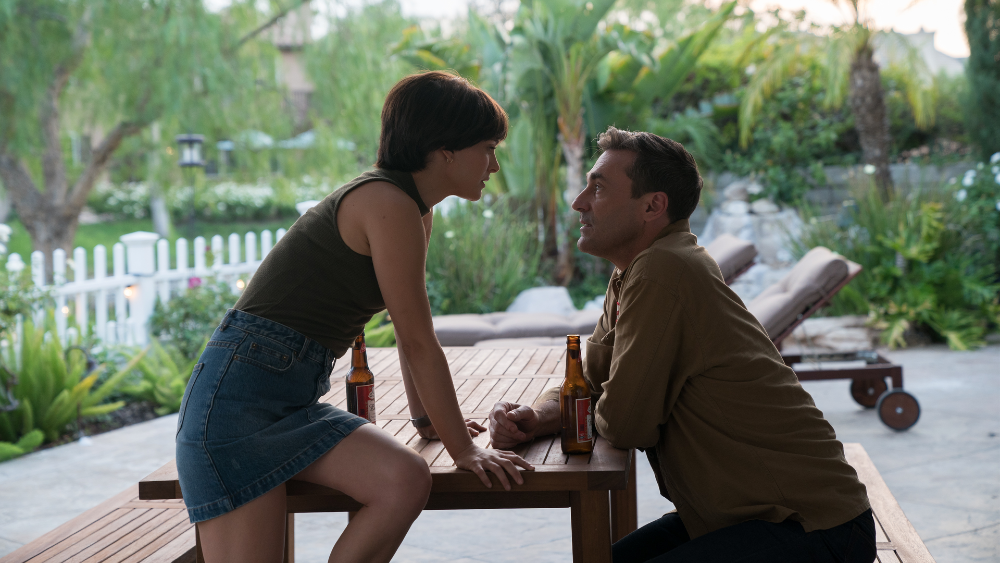
THE BEAT: I could totally see Reese in this role as well, since she already has the accent, but was there a reason she decided not to do it? I guess she had Big Little Lies?
Hawley: Yeah. When I first signed on it was to make this movie with her and then over time our schedules just didn’t line up. She had launched Big Little Lieswhile we were talking about making it, and then they committed to making a second one and then she committed to this Jennifer Aniston show. It became clear that, “Well, here’s my window to make them,” and she couldn’t do that.
THE BEAT: That’s hard when you’re trying to do TV and try and do a movie in-between seasons TV is so all-consuming, even if you’re not going to appear on it, even if you’re just executive producer.
Hawley: Yeah, and FX was as flexible as they could be in pushing the third season of Legion, but they couldn’t push it forever, and my obligations in finishing the second season and carving out this window. I mean, the day we wrapped the movie, I was 12 weeks out on Legionand had to write all those scripts and all that while I was editing the film. So, you know, not optimal, but doable.
THE BEAT: Yeah, if you’re a good multitasker, and you kind of have to be to do television, so you’re used to that.
Hawley: That’s true.
THE BEAT: Let’s talk about Natalie Portman, because she obviously gives an amazing performance in this. The places she goes in this movie are from zero to one hundred sometimes. Bringing her in, what was your conversation with her and what were some of her concerns?
Hawley: Well, there’s two movies that usually get made out of this kind of story, right? One of them is a dark comedy, a kind of I, Tonya or To Die For, and the other is more of a thriller – the “unhinged woman” thriller. That is not a movie either of us wanted to make, and neither of those movies was really interesting to me. I mean, what was interesting to me was this magic realism astronaut story about a woman’s existential crisis. I think a lot of the early conversations were about making sure that we were on the same page, that I was really clear on the kind of film that I wanted to make. One that was on her side, that didn’t gloss over the mistakes she made, but also didn’t punish her for them any more than the way that life punished her. You ruin everything and your punishment is that everything is ruined, so I think that was a big part of it.
Obviously, once we got into the making of the film, it was about the placement of the performance. She and I are both have more of an understated approach, I think. I’m allergic to melodrama. The movie has a lot of drama to it and certainly it goes to some very dramatic places, but it’s not in my interest to sort of over-dramatize or over-emotionalize the story that we’re telling. I think we just found over time that our instincts were very similar.
THE BEAT: The most surprising casting for me was Dan Stevens, because I did not recognize him at all. Basically, he shaved and put on a pair of glasses and was acting differently, but I was surprised to find out it was him. What made you cast him as Lucy’s husband?
Hawley: Look, I think the danger in a role like that is that it’s the quote “husband” role where he’s just kind of a patsy, a nice guy, or a pushover. I always feel like a story can only be improved by the amount of points of view you take into it and the fact that he needs to be a fully rounded character. I mean, I thought a lot about an aircraft carrier, right? Because an aircraft carrier, you have thousands of people whose job is to support 10 pilots, and so those pilots are God, right? Everything on that boat from the cooks to the engine room. Like it’s all about launching those planes and those pilots. At NASA, the astronauts are those gods, and as a PR person at NASA, Dan’s character, he married the God, right? It’s all about supporting her on her mission. It’s sort of the opposite gender-wise.
THE BEAT: It’s a nice change. Usually, the actress is playing the wife like in First Man…
Hawley: Yeah, it’s Claire Foy, sort of doggedly playing the wife role. Here, I wanted Dan to bring all those elements that he has, which is he’s so empathetic, he’s very masculine, and yet he trusts her and has faith in her and he knows she’s going through something but she just won’t share with him what it is. You need to be able to empathize.
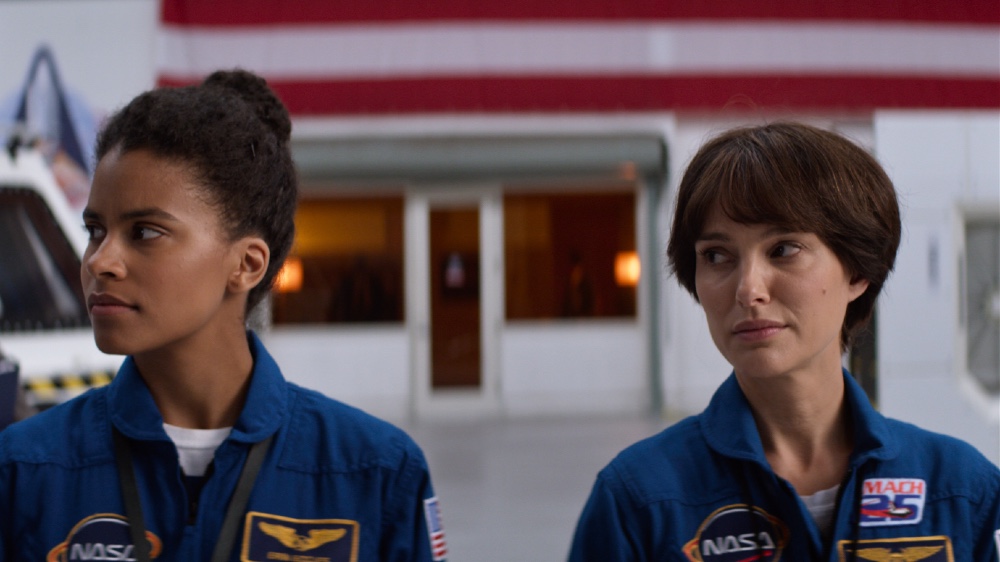
THE BEAT: I want to ask about the Lisa Nowak factor. Other than putting “Inspired by true events” at the beginning, I’m not sure I would have known that Lucy was based on a real woman astronaut and a similar situation. You obviously changed her name and the story, and what happened in a lot of different ways. How much did you feel beholden to acknowledging what really happened?
Hawley: What was compelling to me was these two images – it was a closeup of Natalie floating in space and a mugshot, and how does this end up here, both in a way that I can understand and also a journey that I can take the audience on in which they’re going to empathize with her and not judge her. They’ll be in her shoes, right? There were some elements that were in the original script. In the original script, she had three kids and I thought well, “It’s a lot harder to root for someone who’s cheating on their kids than just someone who’s having an affair.”
THE BEAT: I’m not sure if we actually are rooting for her…
Hawley: Well, there’s an element of, “Do I want to go on this journey with her? Can I, as a human being who has made mistakes and failed in life, give her the benefit of the doubt enough to go on this journey with her?” There were elements like that that I shifted in order to make it so that the audience couldn’t write her off at any particular moment based on their own kind of bias.
THE BEAT: I’m sure Natalie can relate to the character, having been a child star and been in the limelight her entire life. That must be a lot like floating in space, and an experience that you can’t just stroll into a coffee shop when you’re that famous.
Hawley: I think we’ve all had that experience of leaving our life behind, even on a vacation, going to somewhere with natural beauty in which we felt a sense of awe. We’ve seen it get a sense of perspective on the scale of the universe, and gone home and looked at our life and thought, “This is what I was so worried about?” It seems so petty now, you know? I think for a character like Lucy who’s only ever been focused on what, where, when, and how, and who’s never asked why, to suddenly face a lot of why questions, it’s the only place that leads this transformation, you know? The healthy choice would have been, “You know what? I’m going to take a couple of months. I’m going to process what happened. Hey, I’m going to try to get some perspective.” Instead she does what she’s been trained to do, which is to get back to work and get back up there. She’s not sleeping, you know. So, that drive is ultimately her undoing because she can’t just settle down into her own mind and sort of go, why are we here? What is life all about?
THE BEAT: Did you get to work with NASA on the space-related stuff?
Hawley: I didn’t really. I mean, this was never a sort of authorized telling of a literal story. I think our feeling was there’s enough material in the public domain that’s available that we can get the insight that we need without the impression that we’re telling the story that they don’t necessarily feel is their finest hour. I think we just felt like we think we can make the movie without necessarily… It’s like I’ve done shows where if you have an FBI character and you reach out to the FBI, they’re going to want to get involved in like approving storylines and all that sort of stuff, where you’re like, “I think we can make an FBI show without subjecting ourselves to that level of scrutiny.”
THE BEAT: But you had to do some research, especially in terms of the jargon…
Hawley: Yeah, we had a consultant on-set, who understood. A former NASA employee who helped us on the technical side.
THE BEAT: I wanted to ask about that amazing tracking shot that follows Lucy to the hospital.
Hawley: The infinite zoom we called it. There’s a combination of practical elements and visual effects elements. I think I have to pull the magician and their trick response, mostly because I think like any filmmaker, you just want to feel like at least for a few years, that trick might stand on its own until someone else can figure out whether or even how to do it. But yeah, it was a combination, and you really have to figure out where are we going to start it physically, where are we going to end it physically, and how are we going to accomplish a sort of seamless feeling in which obviously she’s the constant? At the same time, it’s a very emotional moment and that has to be the focus of it, and the bells and whistles and the all that. If that’s what you’re focused on…
THE BEAT: Sure, but it was really how she shows emotions during that amazing shot that makes it stand out. Legion just ended after three seasons. I’m not sure if you went into it knowing you’d have three seasons o rif there was more stuff you still wanted to do.
Hawley: I think I told the whole story as I had envisioned it. I didn’t necessarily know in the beginning how long that would take, but I came to feel very much as I was making it that it’s such a complex visual show, that even on an episodic level the show doesn’t want to be long. Episodically, it’s like the minute an episode reached like 48 minutes. I was like, this show should be over right now because there’s so much to take in and process, you know? And I felt like the overall story should respect the same boundaries, which is within the 28 hours that we made of that story we had just enough room to experiment. We could do an alternate realities, multiple realities episode. I could do this fairy tale episode this last year. We could do an episode that took place entirely within Sid’s mind in which David had to re watch her life to learn a specific lesson, enough sort of diversions from the main road to kind of push the boundaries of the medium. But the longer we went, the more risks we had of just sort of like, now they’re just indulging themselves now. Certainly that middle year there was a lot more experimentation. And then the last year, as stories do in their last act, you’ve got to focus. And really push the drama. And I think that was very rewarding to the audience.
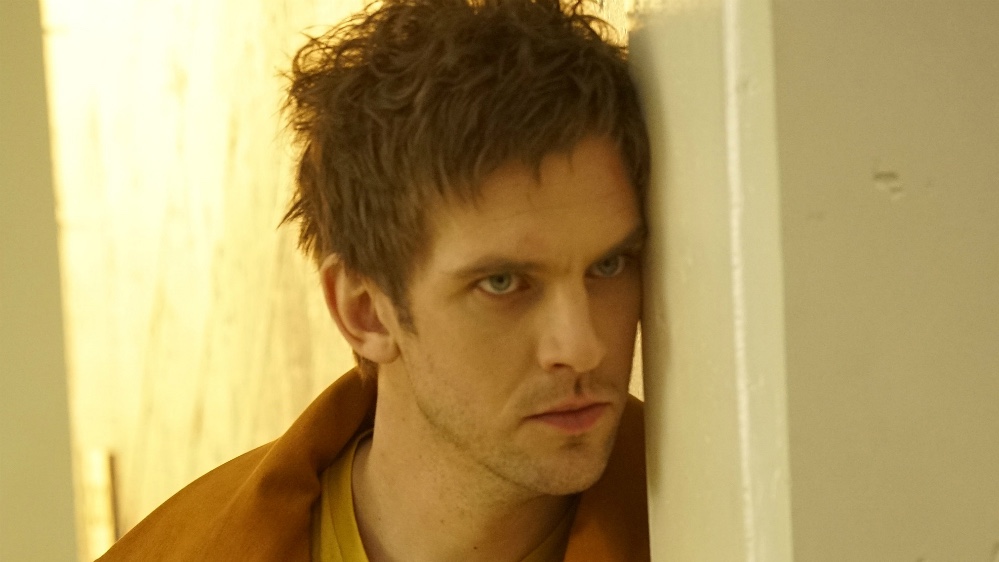
THE BEAT: I think Dan Stevens did a great job on that show. I interviewed him for a movie at Tribeca before Legion aired, and I only knew David Haller from the comics. I had no idea what you were going to do, but I thought it was a really interesting way to go with it.
Hawley: He’s so grounded and relatable and human that even in the most heightened moments, he just felt like a character going through a crisis. Anytime you tell someone they have to gesture to make a superpower happen, we all know in watching, like sometimes the actor sells it, and it’s just part of the character, and sometimes can feel their self-consciousness, like being on a green screen stage. (Note: Oh, you mean like in Dark Phoenix?) For Dan, it was always like an emotional expression, a feeling, so I think that’s really great.
THE BEAT: How are things going on Fargo? Have you started shooting Season 4 yet or is it done?
Hawley: Not yet, we start in a about a week and a half, and I’m directing the first two, so I should be there prepping right now. Instead, I’ve taken two weeks to launch this movie and I’m happy to do it. But it also means when I get back there, it’s a sprint to get into it.
THE BEAT: Is there anything you’re going to bring from directing your first movie into your TV work, anything you might do differently?
Hawley: I think the more experience I get, the more comfortable I get in my authority as a visual storyteller, because I have to wear a producer hat, a director hat, and a writer hat. The balance of that, the understanding that you’re on a clock, the understanding that you’re on a budget, I mean it can be a bit paralyzing, but the more experience I have the more I’m able to prioritize and say, “Yes, I know in a perfect world we would wrap this before lunch, but we’re not going to wrap this before lunch. But I’m also committing to make that time up at the end of the day.”
Honestly, after Legion and Lucy, which are both very experimental, cinematic storytelling exercises, I am excited to get back to just a good story well told. You know what I mean? In which there’s an economy of cinematic language, camera moves according to some very organizing principles. It’s not subjective filmmaking, all of that. I’m very excited to just move the camera when it’s called for and work with the actors and realize the story.
Lucy in the Sky is now playing in select cities and will expand into further places over the next few weeks. You can keep up with Noah Hawley’s doings at his personal blog, NoahHawley.com.


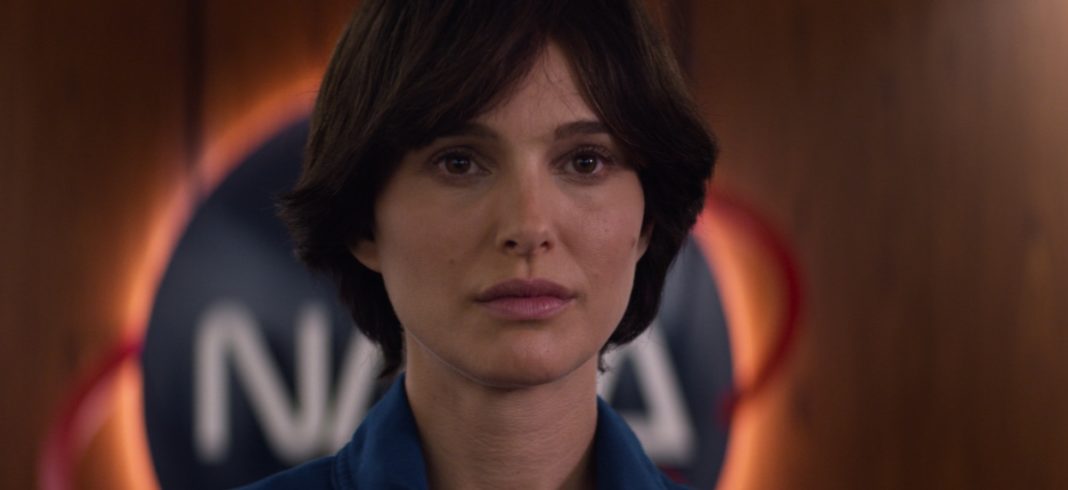


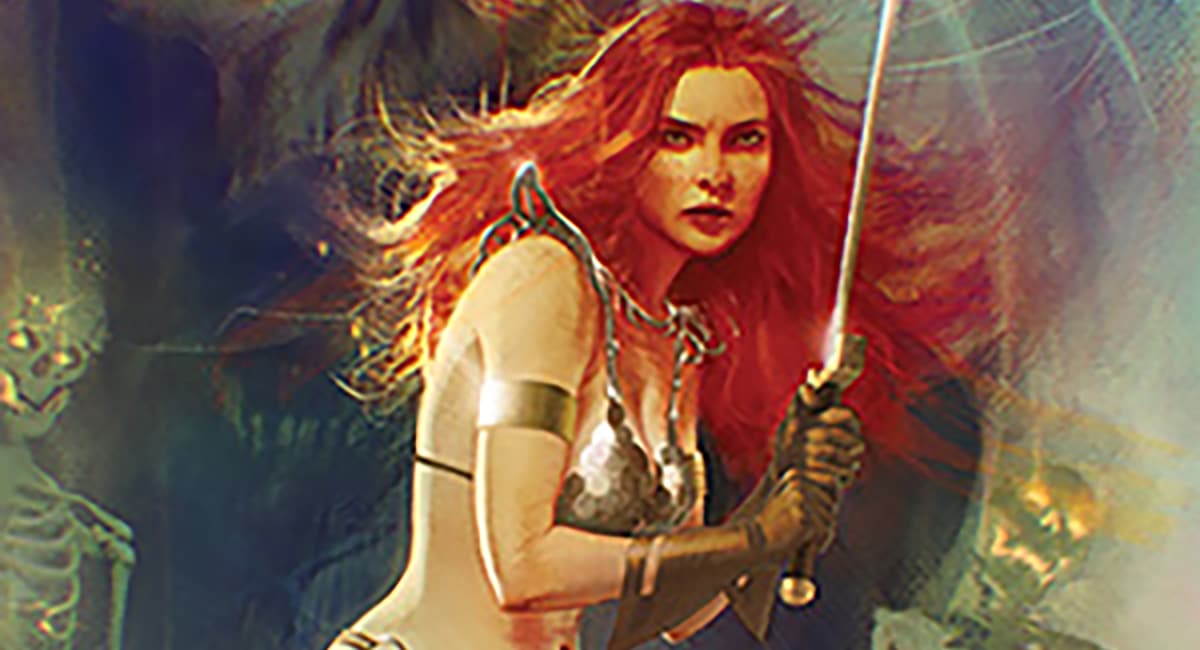


I have no idea who the audience for this movie is supposed to be. The trailer is unappealing. The character is unappealing. There’s a lot more interesting movies playing out there.
Comments are closed.